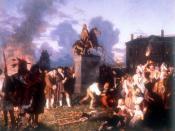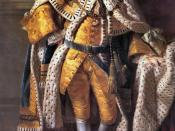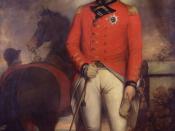By time of the Revolutionary War, many Americans were calling for independence from Great Britain. The Declaration of Independence was an agreement by many important American figures to sever ties with Great Britain. Led by radical Patriots, they demanded separation from Britain and even accused King George III of tyranny over the colonies. However, the colonists were wrong to accuse the King of Britain of absolute tyranny and usurpation because Parliament was equally responsible for colonial government and any kind of law seemed like tyranny after the policy of salutary neglect.
The American leaders made a false accusation against King George III. A tyranny is an absolute rule, which George III did not have. A body of lawmakers, called Parliament, was along side the King making decisions. In 1216, the Magna Carta was agreed upon by King John, giving the aristocracy some rights and privileges in the English law system.
In the late 13th century, Parliament was established to control finance and help to set limits on the King's power. As evidence states, there was no clear tyranny over America by the King.
Many Americans went so far as to accuse King George III of tyranny because their rights and privileges had been violated. In the English system of law, every many has three basic principles. These Rights of Englishmen are taxation only with representation, the right to trial by jury, and government according to law. The colonists would have been correct to make their case against Parliament, for it was this body of lawmakers that denied Americans two basic rights - taxation only with representation and the right to trial by jury. It was Parliament that imposed the numerous taxes, such as the Stamp Act and Tea Act, without giving the colonists any representation. It was also Parliament...


